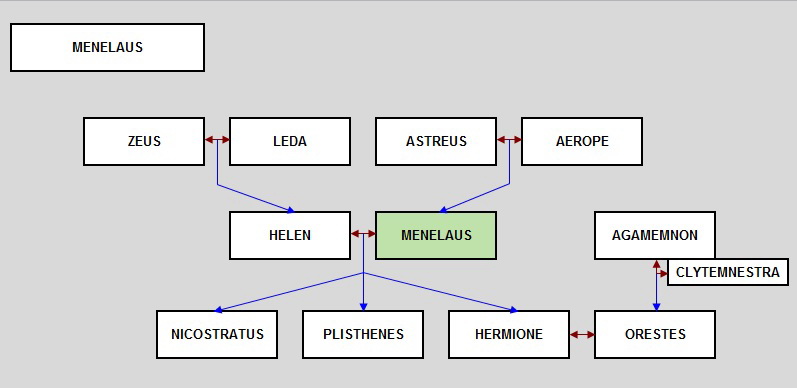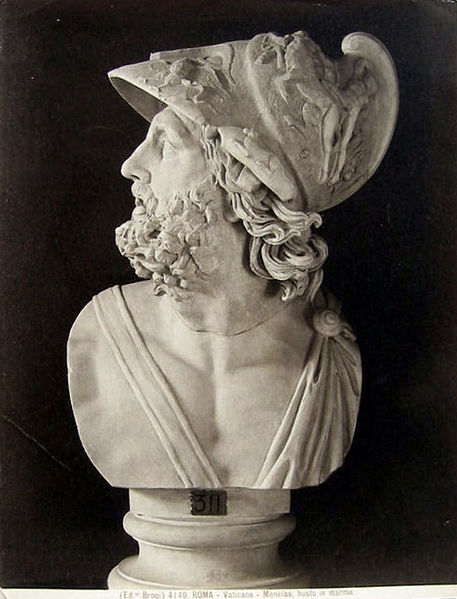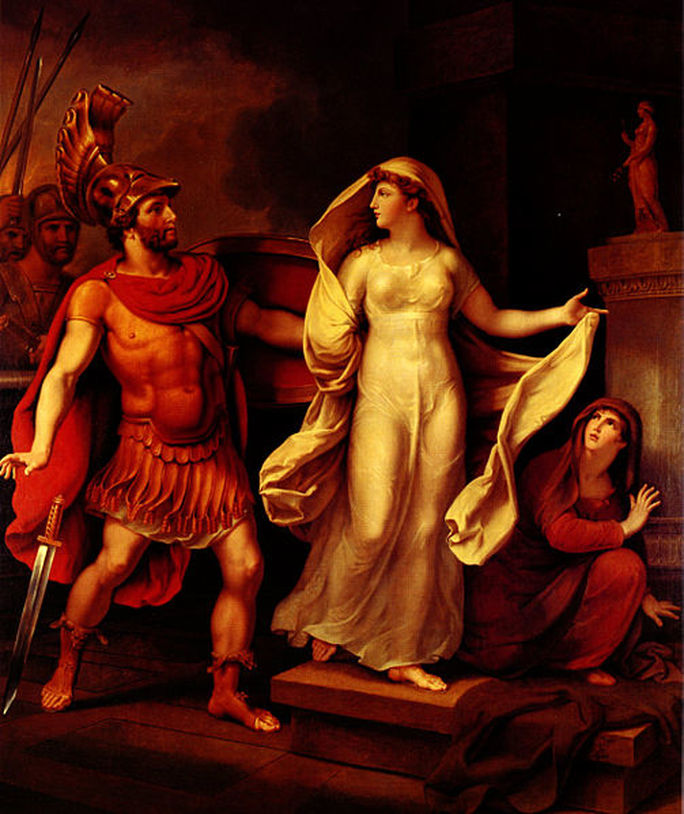KING MENELAUS GREEK MYTHOLOGY
Today, the name of Menelaus is probably unrecognisable to most people, but in Greek mythology he was a central figure in one of the great tales, the story of the Trojan War. For Menelaus was, at the time, the King of Sparta, and husband to the beautiful Helen.
Menelaus and the House of AtreusMenelaus was a member of the cursed House of Atreus, born of the line of Tantalus, with his father named as King Atreus of Mycenae, and his mother, Aerope, granddaughter of King Minos.
Menelaus was of course also brother to the famous king, Agamemnon. A curse on the line of Tantalus saw disaster befall each member of the family, and in their youth, Menelaus and Agamemnon were exiled from Mycenae, when their father Atreus was killed by his nephew, Aegisthus, during a dispute for the throne. |
Menelaus and Agamemnon in Sparta
|
Menelaus and Agamemnon would firstly find sanctuary in Sicyon, in the court of King Polyphodes, and then the brothers travelled onwards to Calydon and the court of King Oeneus.
In Calydon, Menelaus and Agamemnon started to plan their return to Mycenae, and from Calydon, the pair would travel to Sparta to enlist the help of the most powerful king of the day, Tyndareus. |
|
A powerful army was raised, and the forces of Mycenae crumbled away in the face of the invading army. Agamemnon would replace his uncle, Thyestes, as king of Mycenae, and his new queen would be Clytemnestra, the daughter of Tyndareus and Leda.
Menelaus weds Helen
|
Tyndareus had a second "daughter", Helen, and Menelaus had his heart set on marrying her, but Helen was the most beautiful and eligible woman of the age, she was after all the offspring of Zeus, born to Leda.
When Helen came of age to marry, news soon spread over the ancient world, and the most famous single men of their age travelled to Sparta to stake their claim. King Tyndareus was now faced with a quandary, for to choose one suitor over another could lead to violence and recriminations. It was then that Odysseus was said to have come up with the idea of the Oath of Tyndareus, where each Suitor of Helen would agree to protect and defend the chosen husband of Helen. No suitor would dare break their oath, and so violence then and in the future could be avoided. When all the suitors agreed to be bound by the Oath of Tyndareus, the Spartan king then chose Menelaus to be husband of Helen. The disappointed suitors dispersed back to their homelands, and Tyndareus then abdicated the throne of Sparta, and left the kingdom to his new son-in-law; for by this time his two sons, Castor and Pollox, had left the earthly realm. |
|
Menelaus King of Sparta
Sparta prospered under Menelaus, but there was intrigue afoot in the realm of the gods, and during the judgement of goddesses’ beauty by Paris, Aphrodite would bribe the Trojan prince. Aphrodite promised Paris the hand of the most beautiful mortal alive, Helen, ignoring the fact that Helen was already wed to Menelaus.
Eventually, Paris came to Sparta, and was welcomed into Menelaus’ palace, the Spartan king being unaware of the Trojan’s plans. Whilst Menelaus was absent from Sparta, attending the funeral of Catreus, Paris acted, removing Helen, either by force, or else Helen went willingly, and a large amount of Spartan treasure.
The common story then tells of how Menelaus invoked the Oath of Tyndareus to bring forth the former Suitors of Helen, in order that Menelaus could retrieve his wife; and so 1000 ships were launched against Troy.
Menelaus would lead 60 ships of Lacedaemonians from Sparta and surrounding cities.
Eventually, Paris came to Sparta, and was welcomed into Menelaus’ palace, the Spartan king being unaware of the Trojan’s plans. Whilst Menelaus was absent from Sparta, attending the funeral of Catreus, Paris acted, removing Helen, either by force, or else Helen went willingly, and a large amount of Spartan treasure.
The common story then tells of how Menelaus invoked the Oath of Tyndareus to bring forth the former Suitors of Helen, in order that Menelaus could retrieve his wife; and so 1000 ships were launched against Troy.
Menelaus would lead 60 ships of Lacedaemonians from Sparta and surrounding cities.
Menelaus and the Trojan War
For a favourable wind though, Agamemnon was advised that he would have to sacrifice his daughter, Iphigenia; and Menelaus eager to set sail, cajoled his brother into undertaking the sacrifice; although Iphigenia was probably rescued by the gods before she was killed.
Eventually, the Achaean forces arrived at Troy, and Menelaus and Odysseus went ahead to claim the restoration of Helen and his property. The refusal of Menelaus’ request would lead to a ten year war.
During the war Menelaus was protected by the goddesses Hera and Athena, and although not amongst the greatest of Greek fighters, Menelaus was said to have killed 7 named Trojan heroes, including Dolops and Podes.
Menelaus was also said to have been one of the Greek heroes, alongside the Aiantes and Meriones, who retrieved the body of Patroclus when he had fallen during battle.
Eventually, the Achaean forces arrived at Troy, and Menelaus and Odysseus went ahead to claim the restoration of Helen and his property. The refusal of Menelaus’ request would lead to a ten year war.
During the war Menelaus was protected by the goddesses Hera and Athena, and although not amongst the greatest of Greek fighters, Menelaus was said to have killed 7 named Trojan heroes, including Dolops and Podes.
Menelaus was also said to have been one of the Greek heroes, alongside the Aiantes and Meriones, who retrieved the body of Patroclus when he had fallen during battle.
Menelaus Fights Paris
|
During the war Menelaus is most famous for his combat with Paris, a fight that came late in the war; this fight was arranged in the hope that the war could be brought to an end.
Paris was not noted as being the most skilled of Trojan defenders, being more adept with the bow than close combat weapons, and ultimately Menelaus got the upper hand Just as Menelaus got into position to achieve a killing blow, the goddess Aphrodite intervened. Paris was Aphrodite’s favourite, and first the goddess broke Menelaus’ hold upon his opponent, and then shielded him in mist until he was back behind the walls of Troy. |
The Trojan War would only eventually end when the ruse of the Wooden Horse was implemented; and Menelaus was named amongst the heroes who entered the belly of the Trojan Horse, and led the Sack of Troy.
During the pillage of Troy, Menelaus sought out Helen, and located her in the company of Deiphobus, a son of Priam, who had been given Helen as a bride for his role in the defence of Troy. Helen was said to have signalled to Menelaus to tell him where she was to be found.
Menelaus killed and dismembered Deiphobus, and some sources say that Menelaus contemplated doing the same to Helen, but his hand was stayed by the gods, and instead, Menelaus led Helen back to the Achaean ships.
During the pillage of Troy, Menelaus sought out Helen, and located her in the company of Deiphobus, a son of Priam, who had been given Helen as a bride for his role in the defence of Troy. Helen was said to have signalled to Menelaus to tell him where she was to be found.
Menelaus killed and dismembered Deiphobus, and some sources say that Menelaus contemplated doing the same to Helen, but his hand was stayed by the gods, and instead, Menelaus led Helen back to the Achaean ships.
Menelaus back in Sparta
|
The sacking of Troy brought with it acts of sacrilege undertaken by the Greeks, and so the surviving heroes all had difficulties returning home. Menelaus, in the company of Helen, and five ships, wandered for several years around the Mediterranean. The wandering though did bring great wealth to Menelaus though through plunder gathered from raids.
In Egypt, Menelaus captured the seer Proteus, and it was the seer who told Menelaus how to appease the gods to allow for a successful return to Sparta. In Sparta, Menelaus and Helen were reunited with their daughter Hermione, but they were soon separated again for Menelaus had promised the hand of Hermione to Neoptolemus, the son of Achilles. Unfortunately, Menelaus had also promised his nephew Orestes that he would marry Hermione, although Orestes was at the time in no state to marry anyone; Orestes being harassed by the Erinyes for the murder of Clytemnestra. So Hermione and Neoptolemus were wed, but Hermione was unhappy, for the son of Achilles, seemed to prefer the company of his concubine Andromache to that of his wife. Menelaus considered killing Andromache to make Hermione happy, but Andromache was protected by Peleus, an older but still strong hero. |
|
Neoptolemus would eventually be killed by Orestes, who took Hermione for his wife.
Two sons of Helen and Menelaus are occasionally mentioned, Nicostratus and Plisthenes, though Nicostratus may have been the son of a concubine, Pieris. A second concubine, Tereis, would provide Menelaus with another son, Megapenthes.
Menelaus would live out his life as king of Sparta, and in Sparta Menelaus and Helen were visited by Telemachus, the son of Odysseus, seeking news of his father. It seems that husband and wife were happy together at this point in time, and indeed Menelaus seems to be one of the few Greek heroes who lived out their life happily.
Even in death Menealus was well looked after, for Hera ensured that he and Helen would live out eternity in the paradise that was the Elysian Fields.
Two sons of Helen and Menelaus are occasionally mentioned, Nicostratus and Plisthenes, though Nicostratus may have been the son of a concubine, Pieris. A second concubine, Tereis, would provide Menelaus with another son, Megapenthes.
Menelaus would live out his life as king of Sparta, and in Sparta Menelaus and Helen were visited by Telemachus, the son of Odysseus, seeking news of his father. It seems that husband and wife were happy together at this point in time, and indeed Menelaus seems to be one of the few Greek heroes who lived out their life happily.
Even in death Menealus was well looked after, for Hera ensured that he and Helen would live out eternity in the paradise that was the Elysian Fields.
Menelaus Family Tree




